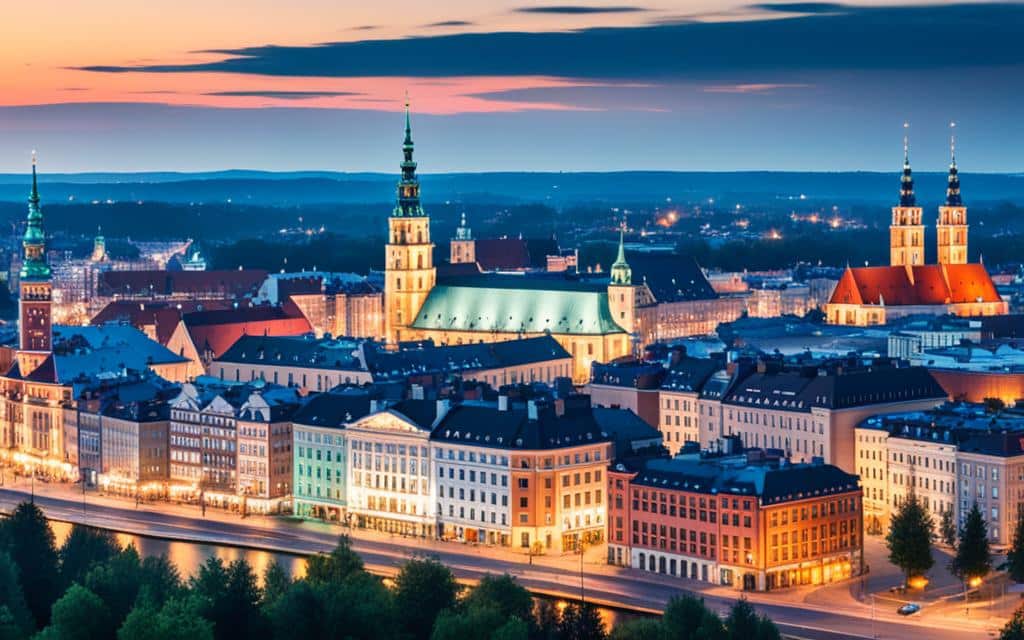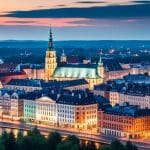Welcome to our in-depth exploration of Poland’s economy and its remarkable diversity. As one of Europe’s fastest-growing economies, Poland offers a vibrant and dynamic business environment that attracts both local and international investors. In this article, we will delve into the various sectors that contribute to Poland’s economic growth, highlighting the country’s unique blend of commerce and opportunities for expansion.
Poland’s economy is renowned for its diversity, with a range of industries driving its growth. From manufacturing and information technology to finance, tourism, and agriculture, each sector plays a vital role in shaping the country’s economic landscape. This diversity not only fosters resilience but also offers numerous avenues for business development and investment opportunities.
Furthermore, Poland’s strategic location, skilled workforce, competitive tax incentives, and integration with the European Union make it an attractive destination for foreign investors. The country has experienced substantial foreign direct investment, with international businesses recognizing the potential for growth and success in Poland’s thriving market.
However, like any economy, Poland faces unique challenges. Regional disparities, income inequality, and labor market imbalances are among the issues that require attention and strategic solutions. The Polish government is committed to addressing these challenges and creating an environment that fosters sustainable and inclusive economic development across the country.
Looking ahead, Poland’s economic future is promising. With a focus on innovation, emerging industries, and government initiatives aimed at attracting new investments, there are abundant opportunities for growth and expansion. As Poland continues to evolve and adapt to the changing global landscape, it remains an exciting and lucrative market for businesses and investors alike.
Historical Overview of Poland’s Economy
In this section, we will provide a historical overview of Poland’s economy, tracing its development from the post-war era to the present day. Poland’s economic history is a testament to its resilience and adaptability in the face of significant challenges.
Following World War II, Poland underwent a period of reconstruction and transformation. The country experienced remarkable economic growth and development, driven by a combination of socialist policies, industrialization, and state-controlled enterprises.
In the 1980s, Poland faced a period of economic turmoil, marked by political unrest and the rise of the Solidarity movement. This led to the implementation of economic reforms, including the shift towards a more market-oriented economy and the privatization of numerous industries.
The transition to a market economy and the subsequent integration into the European Union in 2004 played a significant role in shaping Poland’s economic landscape. The country witnessed a surge in foreign direct investment and trade, particularly in sectors such as manufacturing, services, and information technology.
Today, Poland stands as one of the fastest-growing economies in Europe, with a strong focus on innovation, research, and development. It has successfully attracted multinational companies, becoming a hub for manufacturing, automotive, and business process outsourcing industries.
Despite its impressive economic growth, Poland still faces challenges such as regional disparities and the need for continued investment in infrastructure and human capital. However, the government remains committed to addressing these issues and ensuring sustainable and inclusive economic development throughout the country.
Key Industries Driving Poland’s Economy
Poland is a country with a vibrant and diverse economy, driven by a wide range of industries. These industries play a crucial role in shaping the country’s economic growth and providing employment opportunities for its citizens. In this section, we will explore some of the key sectors that contribute to Poland’s thriving economy.
Manufacturing
Manufacturing is one of the top sectors in Poland, accounting for a significant portion of its GDP. The country has established itself as a manufacturing hub, attracting both domestic and foreign investments. Industrial machinery, automotive, and electronics are some of the prominent sub-sectors within manufacturing that have seen tremendous growth in recent years.
Information Technology
The information technology sector in Poland has experienced rapid growth, thanks to its skilled workforce and favorable business climate. The country is home to numerous IT companies, offering a wide range of services such as software development, cybersecurity, and digital transformation solutions. Polish IT professionals are renowned for their expertise and innovation, making it a thriving industry with immense potential.
Finance
The finance sector plays a crucial role in driving Poland’s economy, providing essential services such as banking, insurance, and investment management. Warsaw, the capital city, is often referred to as the financial hub of Central and Eastern Europe, housing numerous domestic and international financial institutions. The sector has been instrumental in attracting foreign investments and fostering economic growth.
Tourism
Tourism has emerged as a significant contributor to Poland’s economy, with the country attracting millions of visitors annually. Poland’s rich historical heritage, vibrant cities, and picturesque landscapes make it an appealing destination for both domestic and international tourists. The tourism industry generates substantial revenue, creates jobs, and supports businesses across various sectors.
Agriculture
Agriculture has traditionally been an essential sector in Poland, contributing to the country’s food security and rural development. Poland is known for its fertile soil and favorable climate, making it suitable for cultivating a wide variety of crops and rearing livestock. The agricultural sector not only supplies the domestic market but also exports agricultural products to countries worldwide, contributing to Poland’s international trade.
These industries, along with others like energy, logistics, and real estate, serve as the driving forces of Poland’s economy. With a diverse mix of sectors, Poland continues to attract investments and create opportunities for growth and prosperity.
Foreign Investments in Poland
Foreign direct investment in Poland plays a crucial role in shaping the country’s economic landscape. International businesses are increasingly choosing to invest in Poland due to various factors that make it an attractive destination for foreign investments.
1. Strategic Location:
Poland’s strategic location at the crossroads of Europe makes it a gateway for businesses to enter the European market. With its well-developed transportation infrastructure and proximity to major markets, Poland offers convenient access to over 500 million consumers.
2. Skilled Workforce:
Investing in Poland means gaining access to a highly educated and skilled workforce. The country boasts a strong education system and a large pool of talented professionals in various fields, including engineering, technology, finance, and manufacturing.
3. Competitive Tax Incentives:
Poland’s business-friendly tax policies and incentives attract foreign investors. The government offers a range of tax breaks, grants, and subsidies to encourage investment and stimulate economic growth. These incentives contribute to higher returns on investment and increased profitability for businesses.
4. Membership in the European Union:
As a member of the European Union, Poland benefits from access to the EU’s single market and the free movement of goods, services, capital, and personnel. This provides businesses with a vast customer base, reduced trade barriers, and increased stability in the business environment.
Investing in Poland offers businesses the opportunity to tap into a dynamic and growing market with a favorable business climate. The country’s economic stability, competitive advantages, and favorable regulatory framework make it an ideal destination for foreign investments.
Regional Disparities and Economic Challenges
Poland’s economic landscape is not without its regional disparities and challenges. The country’s development varies significantly between urban and rural areas, leading to disparities in economic opportunities and living standards. Urban centers such as Warsaw, Krakow, and Wroclaw have experienced rapid growth and development, attracting investments and creating job opportunities. On the other hand, rural regions face slower economic growth, limited infrastructure, and a lack of diverse industries.
One of the notable economic challenges in Poland is income inequality. Despite the overall economic growth, there is a significant wealth gap between the rich and the poor. This disparity poses social and economic challenges, affecting access to education, healthcare, and opportunities for upward mobility.
The labor market also presents imbalances, particularly in sectors such as agriculture and manufacturing. While urban areas struggle with a shortage of skilled workers, rural regions experience high unemployment rates and a lack of job opportunities. These imbalances further contribute to the economic disparities between regions.
Furthermore, demographic changes pose additional challenges. Poland’s aging population and emigration of young people seeking better opportunities in other countries pose a strain on the economy. The loss of young talent impacts the workforce and potentially slows down economic growth.
Addressing these regional disparities and economic challenges requires a comprehensive approach involving targeted regional development policies, investments in infrastructure, and initiatives to address income inequality. It is crucial to promote economic opportunities in rural areas, improve education and vocational training, and foster innovation and entrepreneurship. By addressing these challenges, Poland can achieve more balanced economic growth and enhance the quality of life for all its citizens.
Future Prospects and Opportunities
As we look towards Poland’s economic future, it is clear that the country holds immense growth potential and offers attractive investment opportunities. The government has been actively implementing initiatives to foster innovation and attract new investments to drive economic development.
One of the key areas of focus is the promotion of emerging industries. Poland is witnessing a surge in sectors such as renewable energy, e-commerce, and advanced manufacturing. These industries present exciting prospects for investors, as they benefit from Poland’s skilled workforce and strategic location within the European Union.
Additionally, the government is taking measures to address the challenges that lie ahead. Poland’s economic future depends on addressing issues such as income inequality and labor market imbalances. Efforts are underway to ensure inclusive growth and provide equal opportunities for all citizens.
With its strong economic foundation and favorable business climate, Poland continues to attract foreign direct investment. The country’s membership in the European Union, competitive tax incentives, and skilled workforce make it an enticing destination for global businesses looking for growth opportunities.














